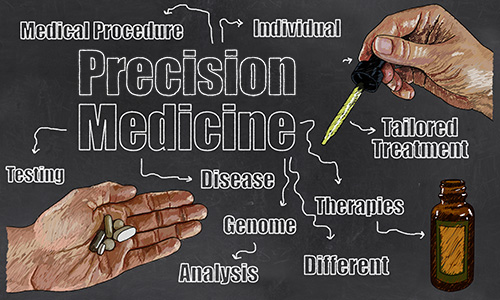
Accelerating Precision Medicine with LIMS
Transforming Data into Insights for Personalised Therapies
Precision medicine relies on the identification of biomarkers and genetic variations associated with specific diseases and drug responses. Pharmaceutical R&D departments play a crucial role in discovering and validating these factors, as well as understanding the underlying mechanisms that drive individual variations in drug efficacy and safety.
The development of targeted therapies tailored to individual patients means R&D groups are no longer just responsible for identifying disease pathway targets and optimising drug candidates but are also responsible for identifying and understanding genetic pathways associated with disease. In addition, R&D groups are responsible for conducting specialised pre-clinical/clinical trials designed to assess efficacy and safety of both treatments and vector delivery methods in specific patient populations.

Synthetic biology has also become a critical part of the development lifecycle in areas such as cancer research and cell and gene therapies. It offers powerful tools for engineering and manipulating biological systems, allowing researchers to design and construct customised therapeutic agents with enhanced precision and functionality while enabling the development of novel approaches for target therapies.
But how can pharmaceutical R&D departments accelerate the development of personalised therapies tailored to individual patients’ genetic profiles and disease characteristics?
Leveraging LIMS for Faster Results
Laboratory information management systems are essential to precision medicine because they perform vital functions of
streamlining data management, integrating laboratory processes, and facilitating the efficient analyses of patient-specific information. A LIMS enables seamless tracking and management of patient samples, genomic data, and clinical information, enhancing the accuracy and speed of diagnostic testing, treatment selection, and therapeutic monitoring in personalised medicine approaches.
These benefits can be further enhanced by seamlessly integrating a semantic search engine with LIMS, a synthetic biology platform, and an ELN to unlock the full potential of your data. This has three significant benefits for R&D in the realm of precision medicine:

- More Efficient Data Retrieval: Better recognition of the meaning and context of data via a semantic search engine can enable researchers to quickly search and retrieve relevant information from vast amounts of data stored in diverse systems, including LIMS, ELN, synthetic biology platforms, private data warehouses, recent publications, chemical searches and more. This includes retrieving experimental protocols, previous research findings, molecular structures, and clinical data related to specific diseases or genetic variations.
- Knowledge Discovery: By leveraging semantic technologies, the LIMS search engine can identify hidden relationships, patterns, and insights within the collected data. This can help researchers discover new biomarkers, genetic variants, therapeutic targets, or potential drug candidates.
- Cross-Platform Integration: Connecting the search engine to LIMS, the synthetic biology platform, and ELN facilitates seamless data integration and interoperability. Researchers can access and analyse data from different sources simultaneously, enabling comprehensive analysis and correlation of experimental results, genomic data, and clinical information.
We’ll dive deeper into semantic search and its benefits in an upcoming blog post. For now, let’s focus on how this seamless integration eliminates the barriers that may be holding you back.
Overcoming Common Drug Development Challenges
The three advantages detailed above are beneficial in and of themselves because they streamline the pharma R&D lifecycle. In addition, they deliver added value by helping you move beyond common challenges like these:
- Data Silos: Integration addresses the challenge of data fragmentation by connecting different systems and enabling seamless data exchange.
- Data Overload: Semantic search enables efficient data retrieval, filtering, and analysis, saving time and improving research productivity.
- Data Complexity: Integration tackles the complexity of molecular data, such as genomics and gene expression profiles. Semantic search algorithms enable efficient data processing and interpretation, leading to faster identification of meaningful patterns and biomarkers.
- Knowledge Fragmentation: An integrated system promotes collaboration and knowledge sharing, fostering a collective knowledge base that enhances reproducibility and accelerates discoveries.
- Treatment Design: The integrated system facilitates the retrieval and analysis of patient-specific data, enabling researchers to tailor treatment strategies based on individual patient characteristics.
- Collaboration Barriers: Integration fosters collaboration by providing a shared platform where researchers can easily access and contribute to data, protocols, and findings — breaking down barriers and promoting knowledge sharing.
- Compliance: Providing access to relevant scientific literature, clinical guidelines, and regulatory information, helps researchers navigate regulatory requirements by ensuring compliance and safe implementation of personalised treatments.
- Reproducibility and Validation: Streamlining access to previous research protocols, data, and results enhances reproducibility, allowing researchers to validate findings and build upon existing knowledge.
- Decision Support: The integrated system serves as a decision support tool by providing researchers with relevant information, facilitating evidence-based decision-making.
- Translational Bottlenecks: The integrated system expedites translational research by facilitating collaboration, personalised treatment design, and efficient data analysis, leading to faster translation of research into clinical trials and patient care.
Increasing Research Efficiency
LabVantage integration streamlines precision medicine workflows, reduces manual data retrieval and analysis, and enhances research efficiency. As a result, you can focus more on generating insights and developing innovative therapies and spend less time searching for and managing data.
A single system also allows for greater resource optimisation by integrating multiple fragmented information silos, eliminating redundant data storage, improving data accessibility, and maximising the value of existing infrastructure. This leads to cost savings and more efficient resource allocation.
Product Update Note! LabVantage is currently developing a Synthetic Biology suite of tools that will include support for gene engineering including the development of plasmids and vectors and the creation of synthetic biomolecules. By leveraging these tools along with semantic search provided by the LabVantage Biomax system AILANI, pharmaceutical R&D organisations can accelerate the development of personalised therapies tailored to individual patients’ genetic profiles and disease characteristics.
Are you ready to revolutionise your precision medicine R&D? Contact us today to learn more.